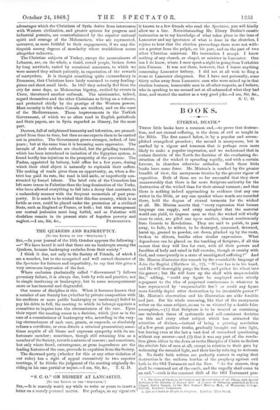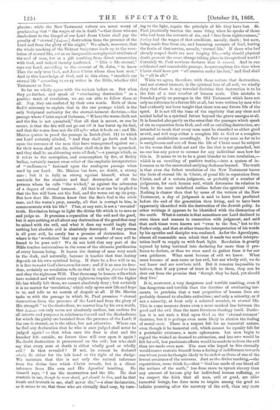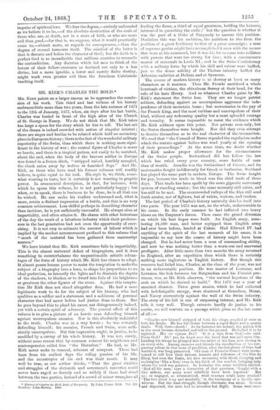BOOKS.
ETERNAL DEATH.*
THESE little books have a common end,—to prove that destruc-. tion, and not eternal suffering, is the doom of evil as taught in the Bible. The first named below, is by a popular and accom- plished evangelical preacher ; the second is anonymous, but is marked by a vigour and terseness that is perhaps even more likely to make a popular impression, and we understand that in certain districts of the North the doctrine of the everlasting de- struction of the wicked is spreading rapidly, and with a certain fervour, in churches otherwise orthodox. Both these little books have some force. Mr. Minton's is marked by the greater breadth of view, the anonymous treatise by the greater rigour of exposition. Both of them are so far successful that they show unanswerably that there is far more Scripture authority for the destruction of the wicked than for their eternal torment; and that there is nothing indeed approaching to evidence that any one writer in the Bible, or any one speaker whose words are recorded there, held the dogma of eternal torments for the wicked at all. Mr. Minton asserts that " every expression that human language can supply, and every metaphor that the material world can yield, to impress upon us that the wicked will wholly cease to exist, are piled one upon another, almost continuously from Genesis to Revelations. They are said to perish, to pass away, to fade, to wither, to be destroyed, consumed, drowned, burnt up, ground to powder, cut down, plucked up by the roots, broken to shivers, besides other similar expressions. What dependence can be placed on the teaching of Scripture, if all this means that they will live for ever, with all their powers and faculties of body and mind in full exercise, though at enmity with God, and consequently in a state of unmitigated suffering ?" And Mr. Minton illustrates this remark by the remarkable language of John the Baptist (Matthew iii., 12), " Whose fan is in his hand, and Ile will thoroughly purge his floor, and gather his wheat into the garner ; but He will burn up the chaff with unquenchable fire," adding, " could any figure be employed more utterly repugnant to the idea of perpetual continuance iii whatever is here represented by unquenchable fire'? or could any figure more forcibly depict utter destruction by its irresistible power ?" Mr. Minton's observation and his illustration are alike forcible and just. But his whole reasoning, like that of the anonymous writer on the same subject, seems to us vitiated by a double false assumption,—(1) that Scripture is to be treated as containing one unbroken tissue of systematic and self-consistent doctrine on this and every other subject which has attracted the attention of divines,—instead of being a growing revelation of a few great positive truths, gradually brought out into light, but leaving even at the last a vast deal of unresolved questioning without any answer—and (2) that it was any part of the revela- tion given either to the Jews or to the Disciples of Christ to declare the absolute fate of men at all, except in relation to their gain by welcoming the revealed light, and their loss by refusing to welcome it. No doubt both writers arc perfectly correct in saying that destruction is the uniform burden of the prophecy against evil both in the Old Testament and the New. "As for sinners, they shall be consumed out of the earth, and the ungodly shall come to an end,"—such is the constant drift of the Old Testament pro- • 1. The Glory of Christ in the Creation and Reonciliation of all Things, with Special Reference to the Doctrine of Eternal Ed!. A Course of Sermons preached at Eaton Chapel, Eaton Square, by the Rev. Samuel Minton, M.A., of Worcester College, Oxford. London: Longman.
2. Life and Death as Taught in 'Scripture. London : Eliot Stock. phecies ; while the New Testament writers are never weary of proclaiming that " the wages of sin is death "—that those who are disobedient to the Gospel of our Lord Jesus Christ shall pay the penalty of " eternal [esice'kiev] destruction from the presence of the Lord and from the glory of his might." We admit, moreover, that the whole teaching of the Hebrew Scriptures leads up to the reve- lation of eternal life, not as an inseparable metaphysical attribute of the soul of man, but as a gift resulting from direct communion with God, and indeed thereby conferred. "This is life eternal," says our Lord, according to the account of St. John, " to know Thee the only true God, and Jesus Christ whom thou hart sent." And in this knowledge of God, and in this alone, " standeth our eternal life " according to every writer in the Bible, whether Old Testament or New.
So far we wholly agree with the writers before us. But when they go further, and speak of " everlasting destruction " as a positive truth of revelation, we are not able to follow them at all. Nay, they are confuted by their own words. Both of them find it necessary to explain that in the one passage which is the only Scriptural authority for the eternal-torment doctrine,—the passage where Christ says of Gehenna, " Where the worm dieth not and the fire is not quenched," that all that is meant, or can be meant, is that the fire will not go out till it has burnt up its fuel, and that the worm does not die till after what it feeds on ; and Mr. Minton quotes in proof the passage in Isaiah (lxvi. 24) to which our Lord certainly alluded, " And they shall go forth and look upon the carcases of the men that have transgressed against me ; for their worm shall not die, neither shall their fire be quenched, and they shall be an abhorring unto all flesh,"—a passage which, as it refers to the corruption, and consumption by fire, of fleshly bodies, certainly cannot even admit of the emphatic interpretation of " endlessness " fastened upon the analogous passage when used by our Lord. Mr. Minton has here, no doubt, a strong case ; but it is fully as strong against himself, when he contends for the absolute and final destruction of all the persons whom he calls "the wicked," as against the advocates of a dogma of eternal torment. All that is or can be implied is that the fire will burn out the fuel, and the worm eat up its prey. But how does Mr. Minton know that the fire's fuel is the whole man, and the worm's prey, namely, all that is corrupt in him, is commensurate with his life ? That, at any rate, is not a revealed' truth. Revelation brings to light the divine life which is to save us and judge us. It promises a separation of the evil and the good, but it says nothing at all about any destruction of the good that may be mixed with the evil, and what it does say would imply that nothing but absolute evil is absolutely destroyed. If any person is all pure evil, he surely has a promise of destruction. But where is the ' revelation' that any man or number of men will be found to be pure evil ? We do not hold that any part of the Bible teaches universalism in the sense of the ultimate purification of every human being. It leaves the destiny of man very much in the dark, and naturally, because it teaches that that destiny depends on his own spiritual being. If there be a free will in us, it is free to resist God's lore even for ever ; and if it so uses its free- dom, certainly no revelation tells us that it will be forced to love and obey the righteous Will. That there may be human wills which have resisted and will resist every righteous impulse till the higher life has wholly left them, we cannot absolutely deny ; but certainly it is no matter for 'revelation,' which only opens new life and hope to us, and tells us no secrets of despair at all. If Mr. Minton tasks us with the passage in which St. Paul promises " eternal destruction from the presence of the Lord and from the glory of His strength " to the disobedient, we answer him by his own words, that clsc,Lpiou can only mean not absolutely endless, but endless for
all intents and purposes in relation to the evil and the disobedience for which the guilty are banished from the presence of the Lord; if the one is eternal, so is the other, but not otherwise. Where can he find any declaration that he who is once judged shall never be judged again ? — that when once the door is shut and the knocker left outside, no future time will ever open it again ?
No doubt destruction is pronounced on the evil ; but who shall say that every man at death is either wholly good or wholly evil ? Is that revealed ? If not, he cannot be declared
wholly fit either for the left hand or the right of the Judge.
We maintain that this is not only the natural inference from the divine love which Christ reveals, but is a direct inference from His own and His Apostles' teaching. He
himself says, " I am the resurrection and the life. Ile that trusteth iu me, though he were dead, yet should he live, and he that
liveth and trusteth in me, shall never die,"—a clear declaration, as it seems to us, that those who are virtually dead may, by turn-
ing to the light, regain the principle of life they have lost. St. Paul practically teaches the same thing when he speaks of those who had been the servants of sin, and "free from righteousness," having had the wages of that condition, namely, death ; but now, being made free from sin, and becoming servants of God, having the fruits of that service, namely, eternal life.' If those who had already reaped death are now reaping life,—why should physical death prevent the same change taking place in the spiritual world? Certainly St. Paul nowhere declares that it cannot. And in one celebrated and remarkable passage, he contemplates the time when Christ shall have put " all enemies under his feet," and God shall be " all in all."
While we agree, therefore, with these writers that destruction, and not eternal torment, is the spiritual fate of all evil, we wholly deny that there is any revealed doctrine that destruction is to be the fate of a vast number of human souls. This mistake is founded partly on passages in the Old Testament which have not only no reference to a future life at all, but were written by men who had evidently not been taught that there was any future life of the spirit. It is not till the time of the captivity that any clear and settled belief in a spiritual future beyond the grave emerges at all. It is founded also partly on the error that the passages which speak of sin as separation from God, and evil as entailing destruction, are intended to teach that every man must be classified as either good or evil, and will reap either a complete life in God or a complete personal annihilation accordingly. Iu fact every man so far as he is unrighteous and cut off from the life of Christ must be subject to the worm that dieth not and the fire that is not quenched, but no one has any power to assume for any individual man how far this is. It seems to us to be a great blunder to turn revelation,— which is an unveiling of positive truths,—into a system of in- ferences as to the unrevealed outlying darkness beyond. The truth is that even the fullest revelation of the New Testament leaves the facts of eternal life in Christ, of penal life in separation from Christ, and of a certain judgment, or probably of a number of judgments, for each human soul, which determine its relation to God, in the most undefined outline before the spiritual vision. Nothing is clearer than that by some of the writers of the New Testament, a day of judgment is said to have been predicted before the end of the generation then living, and to have been apparently identified with the destruction of the Jewish polity. In other writings it appears to be identified with the distraction of the earth. What is certain is that sometimes our Lord declined to state times and seasons in connection with judgment, and said that such times were known not "even to the Son," but to the Father only, and that at other times the interpretation of his words by his apostles and disciples was confused. As for the Apocalypse, almost all reasonable men admit that it needs too much interpre- tation itself to supply us with fresh light. Revelation is greatly injured by being tortured into declaring far more than it pro- fesses to declare, or than we even need to gather from it for our own guidance. What must become of evil we know. What must become of men more or less evil, but not wholly evil, we do not know and are nowhere told. But it remains impossible to believe, that if any power of trust is left to them, they can be shut out from the promise that though they be dead, yet should they live.'
It is, moreover, a very dangerous and terrible teaching, even if less dangerous and terrible than the doctrine of everlasting tor- ments, to proclaim that a vast proportion of human lives are probably doomed to absolute extinction ; and only a minority, or if not a minority, at least only a selected number, to eternal life. This in some measure draws even a more marked line between the good and the evil than the more ferocious theology itself. Doubt- less it is not such a libel upon God as the ' eternal-torment' doctrine, but it is perhaps even more likely to cherish the feeling of moral caste. There is a respect felt for an inunortal nature, even though it be immortal evil, which cannot be equally felt for a perishable existence, a mere ephemeron. Let men begin to regard the wicked as doomed to extinction, and less awe would be felt for evil, less passionate efforts would be made to redeem the evil than are made even now. The man who hoped to live eternally would scarce restrain himself from a feeling of indifference towards
one whose years he thought likely to be as few as those of one of the lowest creatures of the universe. Just as the divine teaching,—the superstition, some think it,—that " God has made of one blood all the nations of the earth," has done more to uproot slavery than any amount of human pity for individual human suffering, so we suspect the faith that all men, evil or good, are alike immortal beings, has done more to inspire among the good an infinite yearning after the recovery of the evil, than any mere impulse of spiritual love. We fear the dogma,—entirely unfounded as we believe it to be,—of the absolute destruction of the souls of those who are, at death, not in a state of faith, or who are more evil than good,—for that is, we suppose, what it would practically come to,—almost more, as regards its consequences,—than the dogma of eternal torments itself. The mischief of the latter is that it distorts and belies the character of God ; but the faith in a perfect God is so ineradicable that millions contrive to reconcile the contradiction. Any doctrine which led men to think of the lowest of their fellow-creatures as destined not only to a less divine, but a more ignoble, a lower and merely finite destiny, might work even greater evil than the ferocious Calvinistic teaching itself.




































 Previous page
Previous page